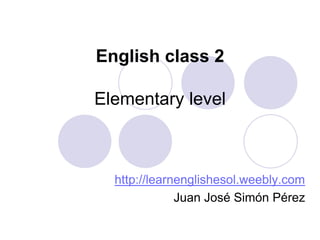
English class 2 a en
- 1. English class 2 Elementary level http://learnenglishesol.weebly.com Juan José Simón Pérez
- 2. SINGULAR VS. PLURAL Most nouns change to plural by adding –s Singular Plural Book Books Coin Coins Flower Flowers
- 3. SINGULAR VS. PLURAL To all nouns finshed in -s,-ss,-sh,-x o –ch, we add them –es Singular Plural Class Classes Box Boxes Flash Flashes
- 4. SINGULAR VS. PLURAL Nouns finished in Singular Plural consonant +y City Cities change –y por –ies Library Libraries Nouns finished in vowel +y Singular Plural add -s Day Days Key Keys
- 5. SINGULAR VS. PLURAL Irregular nouns have got special plural. Study them: Singular Plural Foot Feet Tooth Teeth Man Men Woman Women Child Children Mouse Mice
- 6. SINGULAR VS. PLURAL Exercise. Write the following nouns in plural. 1) Table 2) Mouse 3) Day 4) Child 5) Library 6) Woman 7) Tooth
- 7. SINGULAR VS. PLURAL Exercise. Write the following nouns in plural. 1) Table: tables 2) Mouse: mice 3) Day: days 4) Child: children 5) Library: libraries 6) Woman: women 7) Tooth: teeth
- 8. THIS, THAT, THESE, THOSE This: To talk about single things which are near the speaker (singular + near) That : To talk about single things which are far from the speaker (singular + far) These: To talk about several things which are near the speaker (plural + near) Those: To talk about several things which are near the speaker (plural + far)
- 9. THIS, THAT, THESE, THOSE Some uses in sentences: This/that + is (not) + person name or possesive pronoun (+ noun): This is your friend / That is Mike These/those + are (not) + person names or possesive pronoun + noun: These are your friends / Those are your pens.
- 10. THIS, THAT, THESE, THOSE Examples: This is Toni These are Susan, Mike and John This is my book That is our car These are her books Those are their friends
- 11. THIS, THAT, THESE, THOSE Structure with the verb to BE: Is + this/that + personal name or possesive pronoun + noun ? Are + these/those + personal names or possesive pronoun + noun ? Is this Tony? Are these your keys? Are those his cousins?
- 12. THIS, THAT, THESE, THOSE Exercise. Complete with demonstratives (this, these, that, those) 1) Don’t do it like that, do it ____ way. 2) Take one of _____ books from that pile. 3) Everyone does it _____ present days. 4) Everyone did it in _____ past days. 5) Can you give me ______ pens from that shelf? 6) Which do you like, this one or _____ one 7) I'm leaving ____ Tuesday.
- 13. THIS, THAT, THESE, THOSE Answers: 1) Don’t do it like that, do it THIS way. 2) Take one of THOSE books from that pile. 3) Everyone does it THESE present days. 4) Everyone did it in THOSE past days. 5) Can you give me THOSE pens from that shelf? 6) Which do you like, this one or THAT one? 7) I'm leaving THIS Tuesday.
- 14. POSSESSIVE POSSESSIVE ADJECTIVES PRONOUNS My Mine Your Yours His His Her Hers Its Its Our Ours Your Yours Their Theirs
- 15. POSSESSIVE PRONOUNS They are the same as possesive adjectives, with the difference that they are not followed by a noun. Examples: This isn’t my phone. It’s yours. Those aren’t her books. They’re mine. That’s a nice picture! Is it yours?
- 16. POSSESSIVE PRONOUNS & ADJECTIVES Exercise. Write possessive adjectives (my…) or possessive pronouns(mine…) 1) This isn’t ______ laptop (you). It’s _______ (I). 2) Tom and Lisa are with ______ friends (they). 3) Those aren’t ______ letters (she), they’re _____ (he) . 4) I like ______ job (we), is better than ______ . (they)
- 17. POSSESIVE PRONOUNS & ADJECTIVES Answers: 1) This isn’t YOUR laptop. It’s MINE. 2) Tom and Lisa are with THEIR friends. 3) Those aren’t HER letters, they’re HIS. 4) I like OUR job, is better than THEIRS.
- 18. Thank you for your attention!
